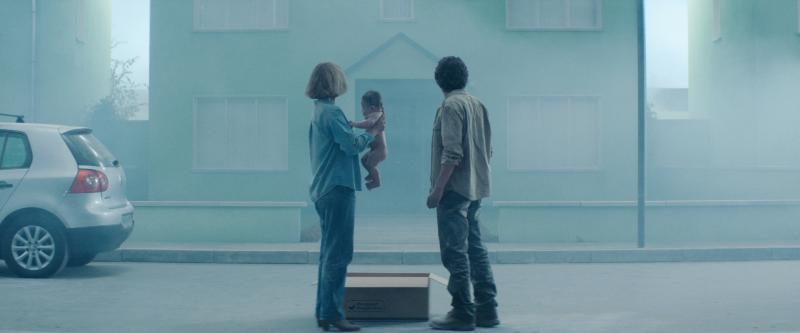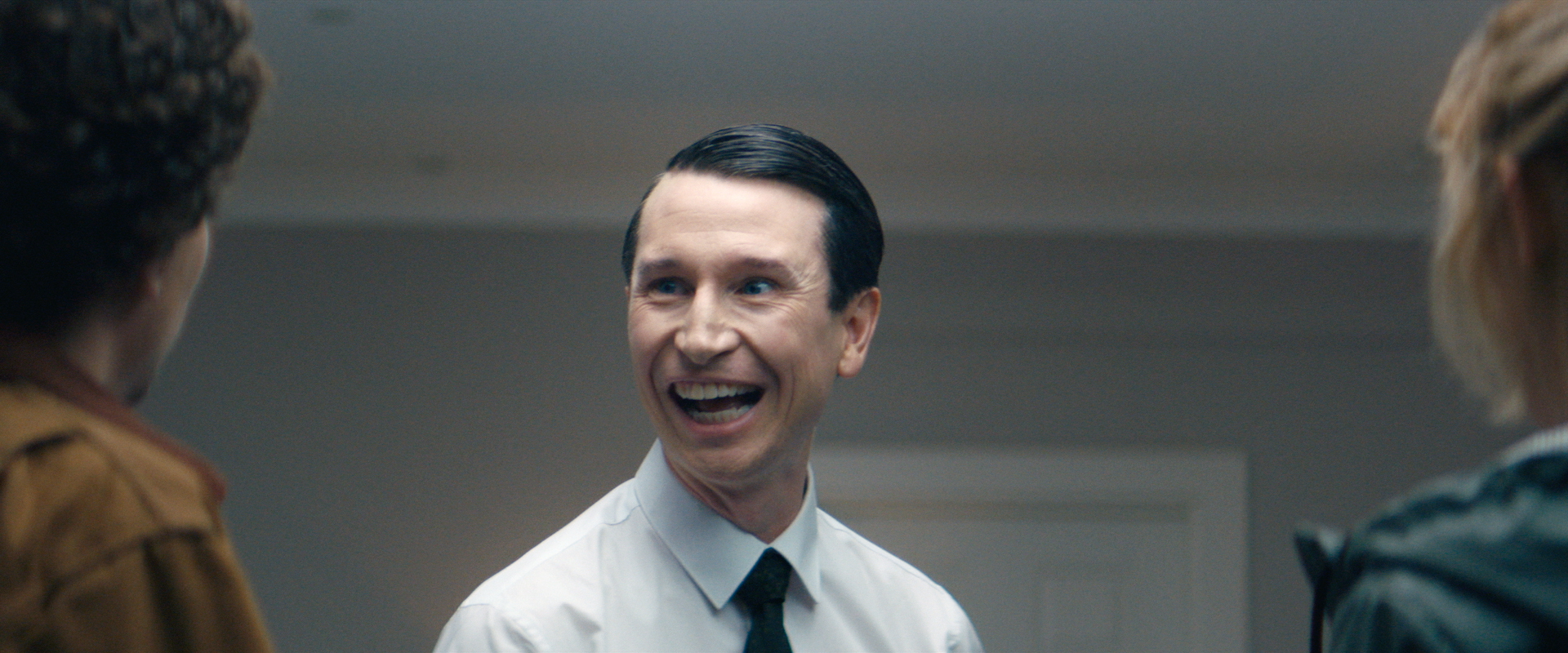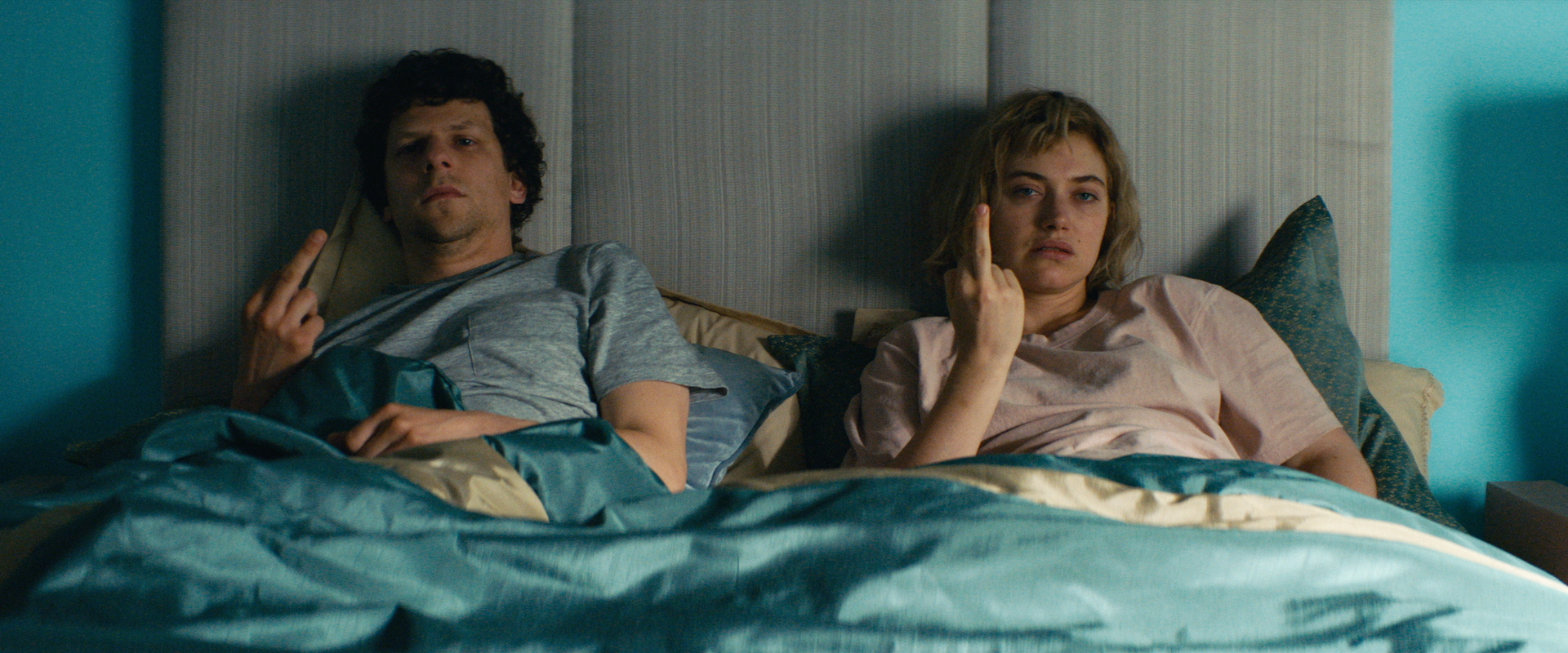Vivarium review – housing ladder to hell | reviews, news & interviews
Vivarium review – housing ladder to hell
Vivarium review – housing ladder to hell
Sharp if limited horror allegory of property and parenthood

Imagine being trapped in your perfect home forever. It’s easy if you try now, as Vivarium’s allegory about property and parenthood is deepened by events.
Director Lorcan Finnegan’s first image is the unsettling alien maw of a cuckoo, as it tosses rival birds from their nest. “It’s only horrible sometimes,” keen primary school teacher Gemma says of nature to a watching child, before leaving work with immature Tom. Talk turns to babies and houses, before they stop off at the sort of weird high street estate agent more usually found in The Twilight Zone.
Politeness and property addiction hush misgivings about “creepy little mutant” agent Martin (pictured below), who abandons them in a suburban estate where, it turns out, you can check in but never leave. The couple’s slowly dawning panic as they drive dry of petrol in a Moebius loop of antiseptic streets beneath eerie blue sky, and presumptions of reality ebb away, is claustrophobically creepy. Our lockdown-circumscribed walks come to mind. Diet, too, as tasteless, odourless food is dropped at their doorstep, and their fridge fills with pointless plenty. A baby boy arrives as well, with the proviso that if they raise it, they can leave.
 The child grows in lurching leaps, mimicking their traits with vicious irony, but showing no human instincts of its own. Gemma veers between protectiveness and hate at this cuckoo in their nest. “You’re a mystery and I’m going to solve you,” she teases, bonding despite herself, yearning for affection from somewhere, the teacher who was good with kids aching to connect. By his accelerated teenage years he scares her, and she longs to swing a bat at his head. This variation on Rosemary’s Baby’s pregnancy fears and messy maternal instincts is the film’s keenest metaphor.
The child grows in lurching leaps, mimicking their traits with vicious irony, but showing no human instincts of its own. Gemma veers between protectiveness and hate at this cuckoo in their nest. “You’re a mystery and I’m going to solve you,” she teases, bonding despite herself, yearning for affection from somewhere, the teacher who was good with kids aching to connect. By his accelerated teenage years he scares her, and she longs to swing a bat at his head. This variation on Rosemary’s Baby’s pregnancy fears and messy maternal instincts is the film’s keenest metaphor.
Gemma and Tom’s relationship accelerates in this hothouse, too. Sex is a greedily grabbed distraction till it sinks into routine, then indifference. Their dance to car stereo ska music is a necessary reminder to them and us of the fresh, uncertain love being crushed. The unnatural boy wrecks even this.
 Eisenberg seems to be glibly coasting on his New York neurotic persona till it cracks, as Tom becomes obsessed with digging under their garden, trying to locate a physical end to their nightmare like an increasingly ragged POW. This doomed masculine drive for power and purpose is a manic extension of his need in an early scene to drive the couple’s car, the gender games people play now redundant.
Eisenberg seems to be glibly coasting on his New York neurotic persona till it cracks, as Tom becomes obsessed with digging under their garden, trying to locate a physical end to their nightmare like an increasingly ragged POW. This doomed masculine drive for power and purpose is a manic extension of his need in an early scene to drive the couple’s car, the gender games people play now redundant.
It’s Poots’ film really, as she dirties her beauty into irrelevance, and howls with feral strength. But Finnegan finally exhausts his allegory, and explains too much. An alien plot to undermine society could easily secrete itself in our insane housing market. This trip down the housing ladder into hell, though, fails to complete its coolly hermetic concept.
The future of Arts Journalism
You can stop theartsdesk.com closing!
We urgently need financing to survive. Our fundraising drive has thus far raised £49,000 but we need to reach £100,000 or we will be forced to close. Please contribute here: https://gofund.me/c3f6033d
And if you can forward this information to anyone who might assist, we’d be grateful.

Subscribe to theartsdesk.com
Thank you for continuing to read our work on theartsdesk.com. For unlimited access to every article in its entirety, including our archive of more than 15,000 pieces, we're asking for £5 per month or £40 per year. We feel it's a very good deal, and hope you do too.
To take a subscription now simply click here.
And if you're looking for that extra gift for a friend or family member, why not treat them to a theartsdesk.com gift subscription?
more Film
 London Film Festival 2025 - a Korean masterclass in black comedy and a Camus classic effectively realised
New films from Park Chan-wook, Gianfranco Rosi, François Ozon, Ildikó Enyedi and more
London Film Festival 2025 - a Korean masterclass in black comedy and a Camus classic effectively realised
New films from Park Chan-wook, Gianfranco Rosi, François Ozon, Ildikó Enyedi and more
 After the Hunt review - muddled #MeToo provocation
Julia Roberts excels despite misfiring drama
After the Hunt review - muddled #MeToo provocation
Julia Roberts excels despite misfiring drama
 London Film Festival 2025 - Bradley Cooper channels John Bishop, the Boss goes to Nebraska, and a French pandemic
... not to mention Kristen Stewart's directing debut and a punchy prison drama
London Film Festival 2025 - Bradley Cooper channels John Bishop, the Boss goes to Nebraska, and a French pandemic
... not to mention Kristen Stewart's directing debut and a punchy prison drama
 Ballad of a Small Player review - Colin Farrell's all in as a gambler down on his luck
Conclave director Edward Berger swaps the Vatican for Asia's sin city
Ballad of a Small Player review - Colin Farrell's all in as a gambler down on his luck
Conclave director Edward Berger swaps the Vatican for Asia's sin city
 London Film Festival 2025 - from paranoia in Brazil and Iran, to light relief in New York and Tuscany
'Jay Kelly' disappoints, 'It Was Just an Accident' doesn't
London Film Festival 2025 - from paranoia in Brazil and Iran, to light relief in New York and Tuscany
'Jay Kelly' disappoints, 'It Was Just an Accident' doesn't
 Iron Ladies review - working-class heroines of the Miners' Strike
Documentary salutes the staunch women who fought Thatcher's pit closures
Iron Ladies review - working-class heroines of the Miners' Strike
Documentary salutes the staunch women who fought Thatcher's pit closures
 Blu-ray: The Man in the White Suit
Ealing Studios' prescient black comedy, as sharp as ever
Blu-ray: The Man in the White Suit
Ealing Studios' prescient black comedy, as sharp as ever
 The Woman in Cabin 10 review - Scandi noir meets Agatha Christie on a superyacht
Reason goes overboard on a seagoing mystery thriller
The Woman in Cabin 10 review - Scandi noir meets Agatha Christie on a superyacht
Reason goes overboard on a seagoing mystery thriller
 London Film Festival 2025 - crime, punishment, pop stars and shrinks
Daniel Craig investigates, Jodie Foster speaks French and Colin Farrell has a gambling habit
London Film Festival 2025 - crime, punishment, pop stars and shrinks
Daniel Craig investigates, Jodie Foster speaks French and Colin Farrell has a gambling habit
 I Swear review - taking stock of Tourette's
A sharp and moving tale of cuss-words and tics
I Swear review - taking stock of Tourette's
A sharp and moving tale of cuss-words and tics
 A House of Dynamite review - the final countdown
Kathryn Bigelow's cautionary tale sets the nuclear clock ticking again
A House of Dynamite review - the final countdown
Kathryn Bigelow's cautionary tale sets the nuclear clock ticking again

Add comment